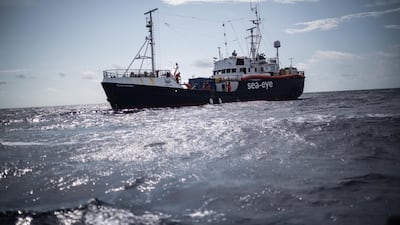The family of Alan Kurdi, the Syrian boy whose body washed up on a Turkish beach during the 2015 refugee crisis, marked the fifth anniversary of his death to call for more help for people fleeing war and suffering.
The boy’s aunt, Tima Kurdi, on Tuesday urged the world not to continue to ignore the plight of refugees.
“We cannot close our eyes and turn our back and walk away from them,” she told reporters in Germany. “People all over the world continue to suffer and it's getting worse, not any better. And they are asking for help.”
Three-year-old Alan Kurdi was found on a beach near the Turkish resort of Bodrum along with his brother, Ghalib, five, and mother, Rehana, on September 2, 2015.
They died after their inflatable boat sank as they tried to reach the Greek island of Kos. Only the boys’ father, Abdullah, survived the journey.
Alan Kurdi was one of an estimated 20,000 people who have died trying to cross the Mediterranean since 2014 but the image of his lifeless body prompted world leaders to promise action.
Turkish President Recep Tayyip Erdogan declared that “humanity has drowned in the Mediterranean Sea” while the French government called for a Europe-wide mobilisation.
Rights groups say that governments have failed to live up to their promises.
The German rescue organisation Sea-Eye renamed its main ship after Alan Kurdi and plans to buy and refit a second boat named after Ghalib before the end of the year.
Sea-Eye said that it had been increasingly tied up in technical and legal disputes with Italian authorities since November last year.
It has been seeking a bigger ship to address the problems and is preparing to buy one backed by funds from the Catholic Church.
"We want to save people from drowning. The only way to do this is to send our ships to sea. That is why we need the Ghalib Kurdi," Gorden Isler, the chairman of Sea-Eye, said.
The recent large-scale wave of illegal immigration to Europe began in 2011, the year that the war in Syria started, but reached a peak in 2015. More than one million migrants arrived that year, with more than half of them from Syria.
The crisis left the EU divided with some countries, mainly in Eastern Europe, keeping their borders closed while Germany offered safety.
The dispute remains unresolved but the closure of borders owing to the coronavirus pandemic has limited opportunities for migrants to cross into Europe and led to an increase in attempted crossings by small boats.
Ms Kurdi said: “In the last five years, many people in Germany have committed themselves to helping refugees. Europe must now work to end the war in my home country. Europe must return to a human rights-based course and create humanitarian corridors.”


